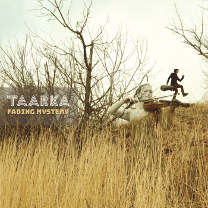The Graham Album Review #1897

Click on CD Cover for Audio Review in streaming mp3 format | |
Taarka: Fading Mystery
by George Graham
(Independent Release As broadcast on WVIA-FM 5/10/2017)

Click on CD Cover for Audio Review in streaming mp3 format | |
Taarka: Fading Mystery
by George Graham
(Independent Release As broadcast on WVIA-FM 5/10/2017)
Under the radar in an era dominated by artificial, computer generated music, in which almost nothing is real, eclectic acoustic music continues to proliferate. The current scene can trace its origins back 30 years to the 1980s, and late 1970s when David Grisman, Sam Bush and others started defying the strictures of traditional bluegrass and mixed non-conventional influences into the instrumentation of bluegrass. The style has widened and encompassed more influences as time has gone on, while a younger generation following the pioneers of three decades have arisen to take up and expand the style. The week we have a new release by a band that has been together for a decade and a half, combining acoustic, bluegrass-influenced instrumentation with sounds ranging from Gypsy jazz to more conventional folk-influenced singer-songwriter fare. The group is called Taarka, and their new seventh studio album is called Fading Mystery.
The core of Taarka, a word that has numerous meanings in different languages, is the husband-wife duo of David Tiller and Enion Pelta-Tiller. David Tiller is an acoustic multi-instrumentalist who grew up on bluegrass, also drawing influence from the Gypsy acoustic jazz of artists like Django Reinhardt. Enion Pelta-Teller is a classically trained violinist who ended up in a punk band for a while. They met in New York in 2001 and began performing in the New York subways, busking. After a period of wandering around together, performing from coast to coast, the duo settled in Lyons, Colorado. They have been releasing a series of eclectic albums, including Adventures in Vagabondia, which we reviewed on this series in 2013. Its music was also used in a documentary film called 1971 that was shown on PBS’s Independent Lens series.
Since their last album, their Colorado town was devastated by floods, which destroyed their house, recording studio and a lot of their archive. For their new album, they raised the production costs through crowd-funding by their fans, journeyed to Virginia and recorded in what is described as a big one-room cabin on the banks of the Potomac River in Eastern, Virginia.
The new album is, interestingly, somewhat less stylistically eclectic than Adventures in Vagabondia, hewing a bit more toward bluegrass and less toward world music and Gypsy jazz. It also features mostly vocal pieces, after previous recordings were about half instrumental. But Fading Mystery is a pleasing recording that shows a greater emphasis on quality lyric-writing.
While their previous albums had a number of special guests, this one features a constant quartet with bassist Troy Robey, who appeared on Vagabondia and guitarist Mike Robinson. David Tiller plays mainly mandolin on this album plus some bits of electric guitar. Both he and his wife Enion do lead vocals, alternating between songs that each of them wrote.
Opening is track that more or less summarizes the sound of the album, Carried Away, which combines a kind of progressive bluegrass texture with lyrics that look upon a journey as a metaphor for events in one’s life. <<>>
One of the more interesting songs on the album is Polyamorous Polly Ann, an attractive waltz sung by David Tiller, about falling in love in a non-monogamous situation. <<>>
The band describes the following song, Athena as kind of lyrical antidote Polyamorous Polly Ann. It also features a kind of progressive bluegrass sound. <<>>
The first of the album’s three instrumentals is an original fiddle tune called What My Darlin;’ Says. Ms. Pelta-Tiller’s five-string fiddle dominates in this attractive bluegrass piece, though everybody in the band gets a solo. <<>>
Don’t Go is a ballad sung by Ms. Pelta-Tiller that involves some mysticism and skepticism about it by a pair of lovers. <<>>
Taarka does include one of the Gypsy-jazz influenced tunes that they had been known for. It’s an original called Retreat, which the band does well with. It also gives everybody in the band a chance for a solo. <<>>
A standout track is Sun and Rain which is done as an upbeat newgrass arrangement with worthwhile lyrics. <<>>
The album ends with its title piece Fading Mystery, an introspective song reflecting on the death in 2006 of Enion Pelta-Tiller’s then-19 year old brother, and how the passage of ten years has affected the sense of loss and the memory of the loved one. <<>>
Fading Mystery, the new seventh studio album by the group Taarka, led by a pair of spouses, is a pleasing, tasteful set of acoustic, mostly bluegrass-influenced music. Not as ecelctic or as instrumentally-oriented as some of their previous releases, the album nonetheless has much going for it, with the thoughtful compositions and the fine playing. The group is also a more tight-knit unit with its now-constant personnel, and that is apparent.
Our grade for sound quality is close to and “A.” The acoustic instruments are nicely recorded and have a warm, natural sound, as do the vocals. Not trying to jack up the loudness by volume-compressing the sound would have made it better.
Taarka is another reminder that in these days of computer-generated commercial pop, one does not need to plug or boot-up samples ripped off from other people’s records to create memorable music that will stand the test of time.
(c) Copyright 2017 George D. Graham. All rights reserved.
This review may not be copied to another Web site without written permission.
 To Index of Album Reviews | To George Graham's Home Page. | What's New on This Site.
To Index of Album Reviews | To George Graham's Home Page. | What's New on This Site.